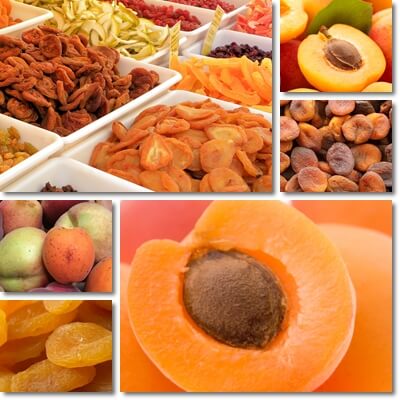Dried apricots nutrition stands out for many reasons, one being the excellent potassium levels in the fruit.
Dried apricots are actually one of the best food sources of potassium, and provide the benefits to match.
Because they are high in potassium, the dry fruit provide several wonderful health benefits, most notably benefits for muscles such as better coordination and quicker reflexes, and combat muscle cramps and spasms, tingling, numbness and muscle weakness. The potassium in dried apricots is further good for hypertension and the heart and cardiovascular system, as well as digestion, blood pressure and bone density.
What is potassium good for?
Potassium is an essential nutrient that must be obtained from the diet every single day in relatively large amounts. The average adult requires up to 4700 mg (milligrams) of potassium a day to be healthy. The dietary mineral is vital for maintaining the electrolyte balance in the human body and holds important benefits for health. Potassium is especially good for hypertension and heart health: it relieves pressure in the blood vessels, helping lower blood pressure numbers, as well as contributes to lower risks of heart attack and stroke.

Getting enough potassium in your diet, and magnesium, is good for preventing and reducing muscle cramps, spasms and twitching such as painful leg cramps, calf cramps, foot cramps and thigh spasms. Indirectly, potassium helps you sleep better and keeps your reflexes quick and even provides benefits for blood sugar management in diabetes and bone density for osteoporosis prevention.
Symptoms of potassium deficiency
When you aren’t getting enough potassium in your diet for some time, you stop feeling good. Symptoms of potassium deficiency include high blood pressure and arrhythmias such as extrasystoles and palpitations, and increased risks of heart attack and stroke.
Potassium deficiency can result in muscle weakness and feeling tired all the time. In addition to fatigue, there may be more frequent muscle spasms and painful cramps such as leg cramps, thigh spasms, calf and foot cramps, eyelid twitching, and tingling and numbness. Breathing may feel difficult, especially when performing physical tasks, and shortness of breath may occur.
A potassium deficiency impacts the muscles of the digestive system as well and can cause problems with food digestion with symptoms such as a longer transit time, constipation and bloating.
Dried apricots potassium content
On average dried apricots have about 4.4 times more potassium compared to fresh apricots. A serving of 100 grams of dried apricots contains 1162 mg (milligrams) of potassium vs 100 grams of fresh apricots which provides 259 mg (milligrams) of potassium.
The average adult requires up to 4700 mg (milligrams) of potassium a day which makes dried apricots a good source of the mineral to consider if you are looking to meet your daily requirements and enjoy the benefits associated with an optimal intake.

How high in potassium are dried apricots?
Do dried apricots have a lot of potassium? A serving of 100 grams of dried apricots has 1162 milligrams of potassium. The average person requires up to 4700 milligrams of potassium a day.
That means that a serving of 100 grams of dried apricots will provide about 25% of the daily requirements of potassium.
By comparison, the same amount of fresh apricots provides only about 6% of the daily requirements of the mineral, which means that dried apricots are quite high in potassium.
But of course, we’re not meant to eat 100 grams of dried apricots a day every single day to get our potassium.
Most dried fruits and nuts have serving sizes of 25 – 30 grams tops which ultimately provides almost the same amount of potassium as the fresh fruit (6 – 8% of daily requirements per 25 – 30 grams serving of dried apricots).
How many dried apricots should you eat a day?
The average serving size for dried fruits and nuts, including dried apricots, is 25 or 30 grams.
Most people eat 1-2 servings a day which is considered a safe amount, enough to get important amounts of potassium in your diet as well as several other essential micronutrients, but not too much to cause side effects.
Overeating dried apricots is problematic because they are high-carb and high-sugar and promote weight gain which is bad for diabetes, blood pressure, blood cholesterol and the cardiovascular system, and health in general.
You can also consult the label to see how many dried apricots you should eat per day considering the nutritional information and recommendations on the label are in accordance with nutritional guidelines set up by health authorities.
See also: Are Peaches High In Potassium?
What are the benefits Of Eating Dried Apricots?
The amount of potassium in dried apricots contributes to the following health benefits:
Benefits for hypertension
Potassium in dried apricots helps relieve pressure in blood vessels, contributing to better blood pressure numbers. If you have high blood pressure, reducing your sodium intake by avoiding adding salt to your food and introducing foods that have a good content of potassium such as dried apricots in your diet is good for the condition and can help you achieve measurable benefits.
Reduced risk of heart attack and stroke
Getting enough potassium (and magnesium) in your diet from both food sources such as dried apricots, milk, bananas or orange juice and dietary supplements is good for heart health and contributes to reduced risks of cardiovascular events by measurably improving blood pressure numbers. Nutrition efforts should be doubled by avoidance of added sodium.
Benefits for arrhythmia
Eating dried apricots is good for palpitations, extrasystoles and arrhythmia in general thanks to the good content of potassium in the fruit, but also the good content of magnesium and calcium. Potassium, calcium and magnesium are electrolytes and are responsible for the correct transmission of electrical impulses from the brain to the heart that signal it to contract rhythmically.
Good for water retention
Potassium in dried apricots actively combats water retention by balancing levels of electrolytes which regulates the amount of fluid in the body. This translates into less swelling in the body, including swelling of the ankles, feet or legs, hands and arms, and face puffiness.
Combat swelling and puffiness
Eating dried apricots ups potassium intake which holds benefits for swollen legs, ankles and feet, swelling in the arms and hands, abdomen and face puffiness.
Benefits for muscles
Potassium in dried apricots functions as an electrolyte carrying electrical impulses from the brain to muscles and coordinating muscle contraction and relaxation. This translates into benefits for muscle cramps and spams.
Benefits for muscle cramps and spasms
Eating dried apricots provides potassium and magnesium which help combat painful muscle cramps and spasms, twitching, numbness, aches and pain, but also muscle weakness by coordinating muscle contraction and relaxation.
Good for great reflexes
Potassium and also magnesium in dried apricots are responsible for carrying electrical impulses from the brain to the muscles contributing to quick reflexes and better coordination.
Benefits for digestion
Thanks to its electrolyte properties, the potassium in dried apricots supports peristalsis and contributes to the movement of food along the digestive tract which results in improved transit time and benefits for constipation relief.
Maintain blood alkalinity and contribute to bone density
One of the functions of potassium is to regulate blood pH. The blood is naturally slightly alkaline, but if it becomes too acidic, the body draws calcium out from bones to compensate for the increased acidity and restore the balance, compromising bone density. Potassium helps maintain blood pH and prevent loss of bone density.
Benefits for blood sugar
Potassium deficiency causes high blood sugar levels. Dried apricots provide good levels of potassium which is important for blood sugar management and can help maintain healthy levels.
Benefits for diabetes
Some diabetes medication cause low blood potassium levels which, in turn, contributes to a raise in blood sugar levels. Eating dried apricots help reverse potassium deficiency which holds benefits such as better insulin sensitivity.
